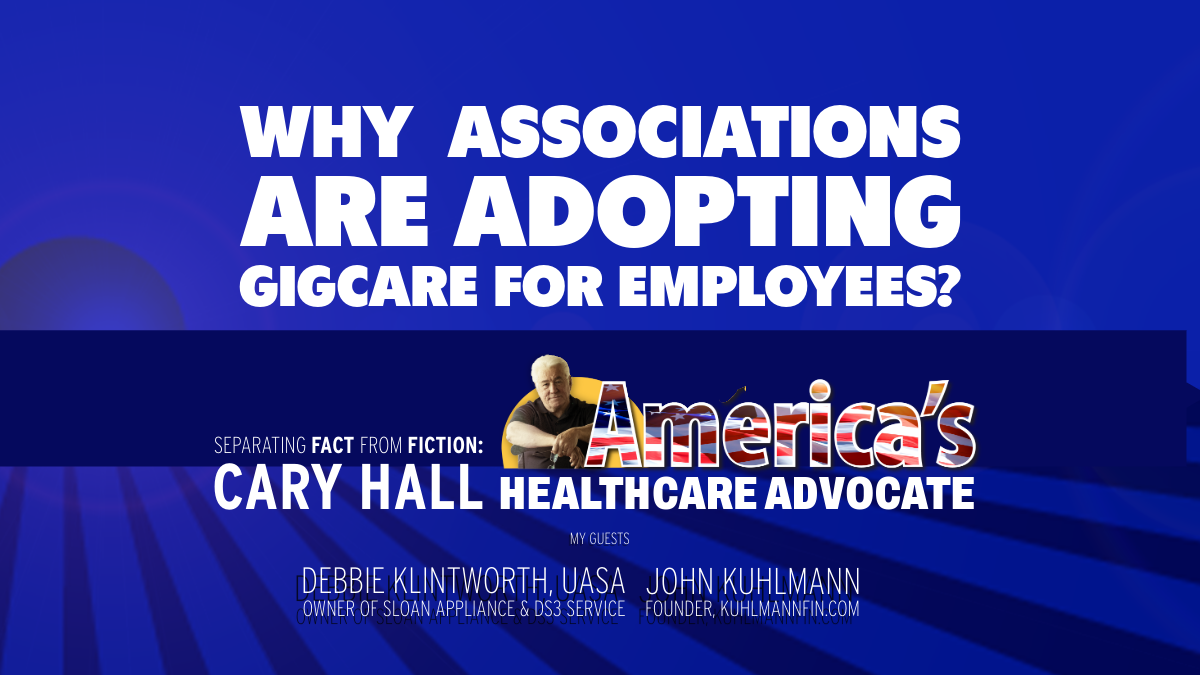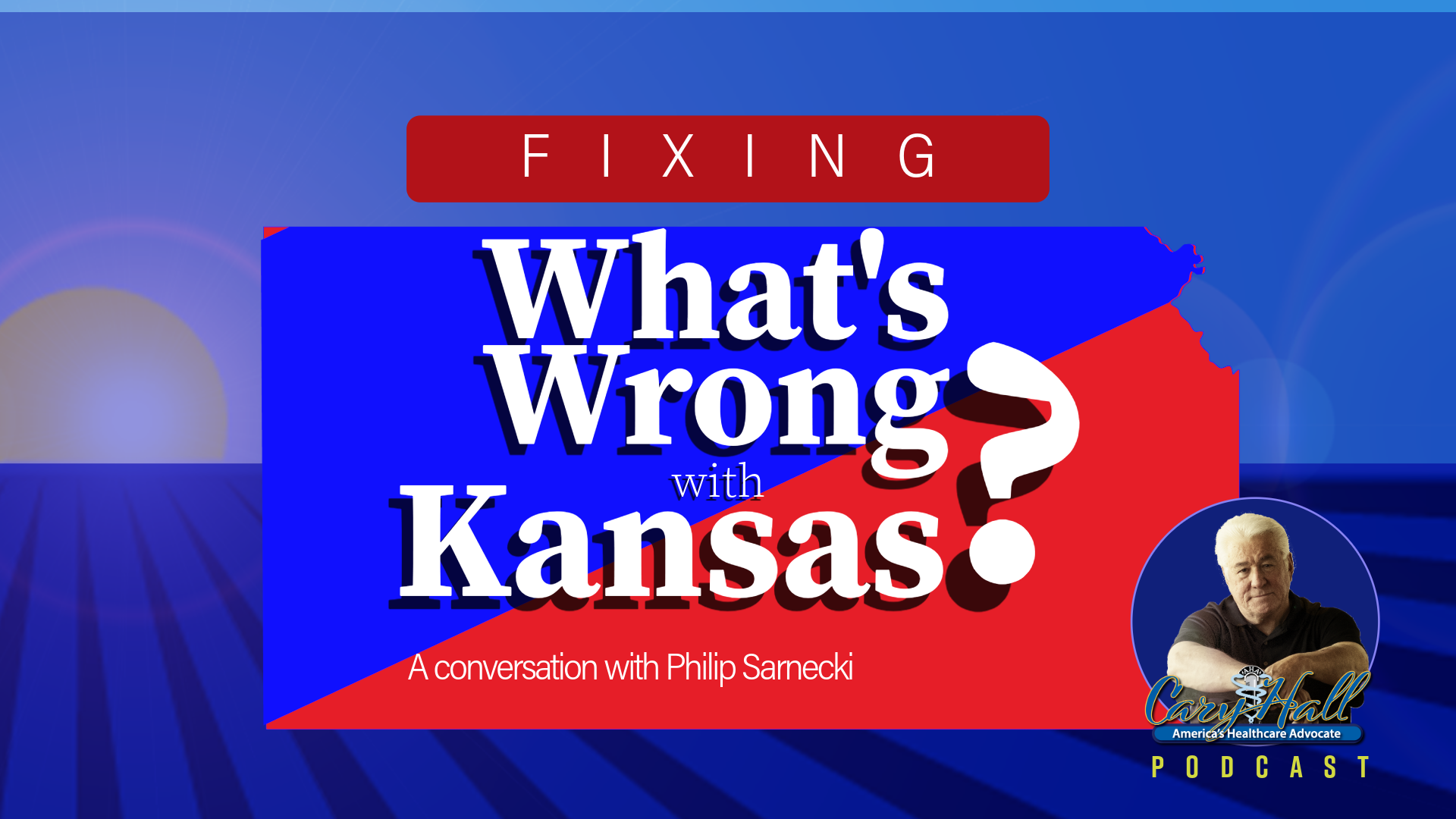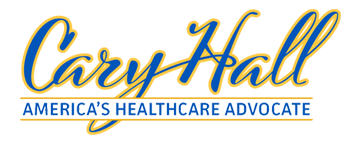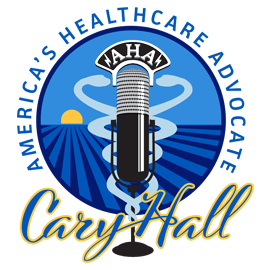Our February Multi Topic Show
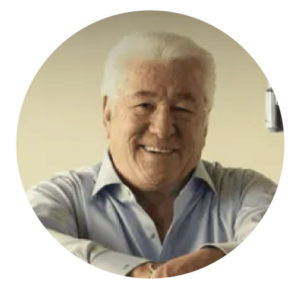
Host:
Cary Hall, America’s Healthcare Advocate
Click Below Check Out Our Other Episodes
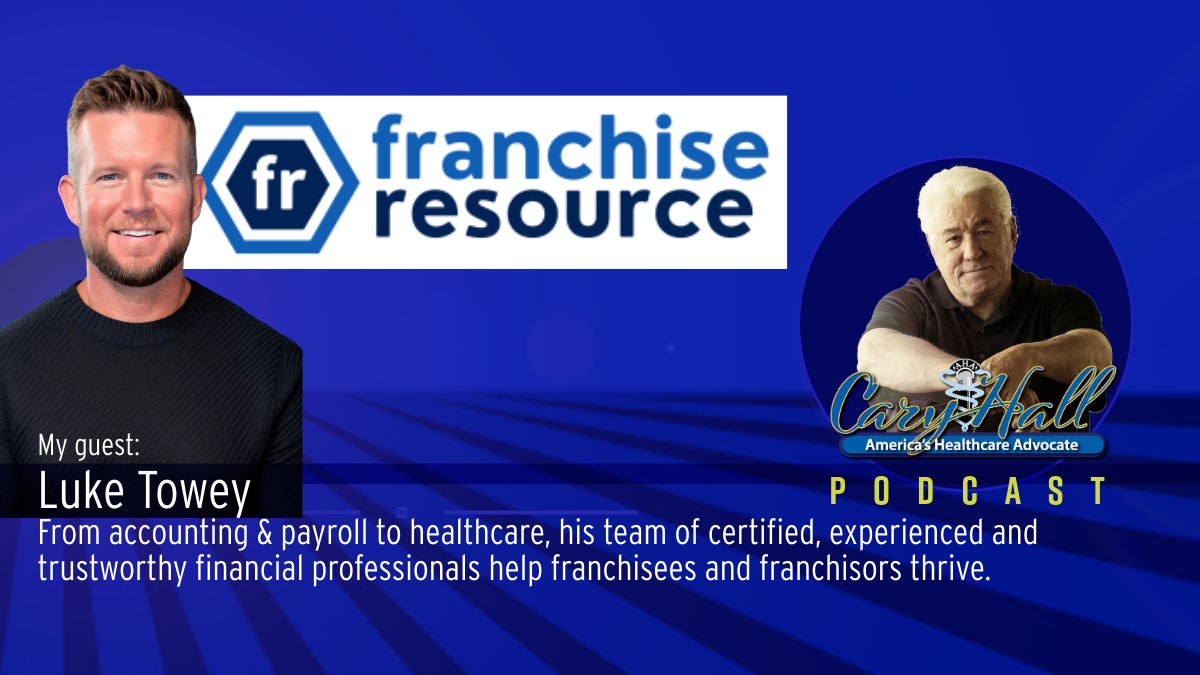
This is a subtitle for your new post
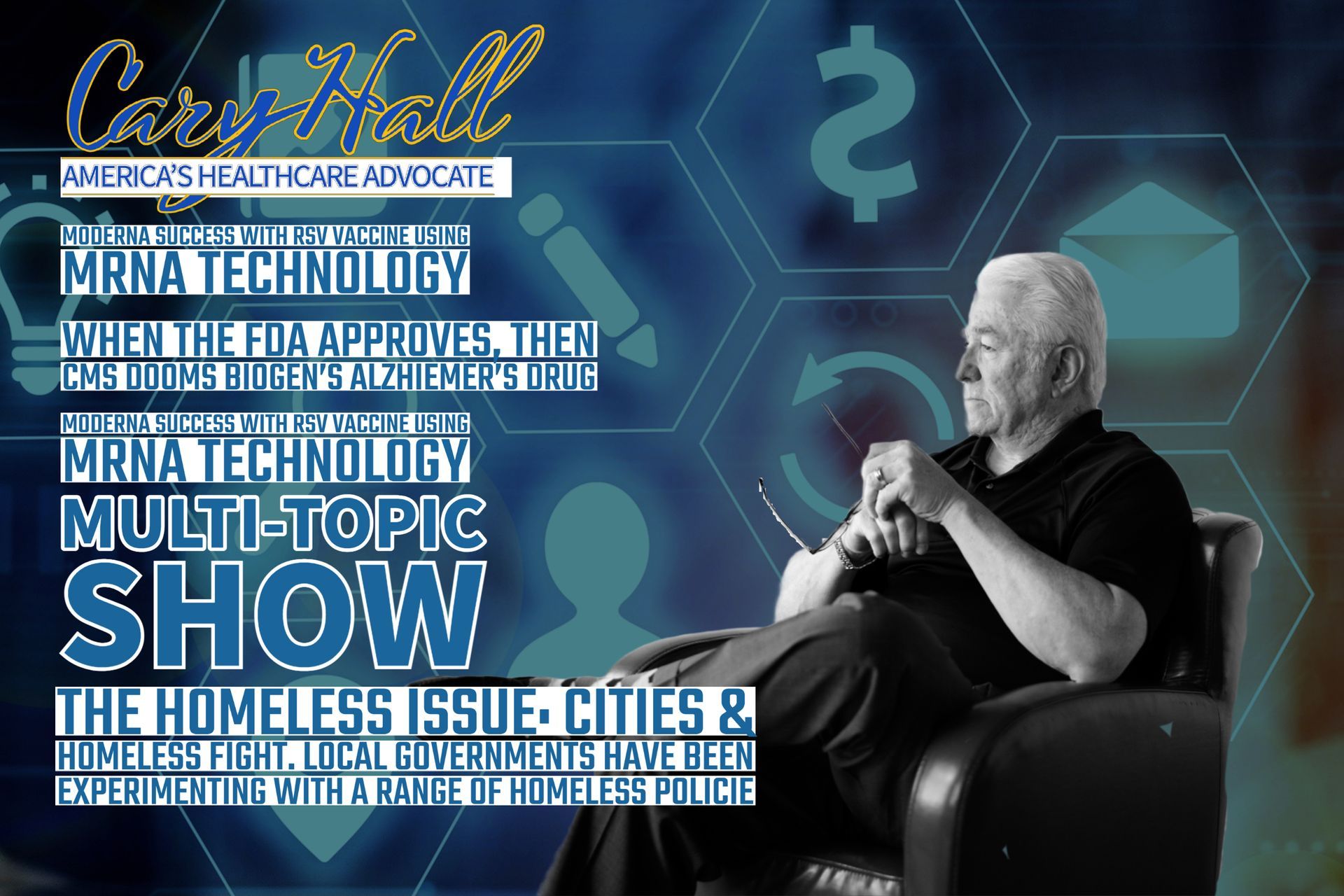
On this Multi Topica Show, I review
- What Happens When the FDA Approves, then CMS Dooms Biogen's Alzheimers Drug Aduhelm, and what else is affected?
- Moderna Success with RSV Vaccine using mRNA Technology, the same tech used in creating the Covid Vaccine
- The Homeless Issue: Cities & Homeless Fight. Local governments have been experimenting with a range of homeless policies, such as involuntarily removing people from the streets when they appear to be mentally ill, confiscating their belongings, and evicting homeless people from public property.
- The Bright Side Of 2022 (vs the negative skew and distortion of the news, politics, and social media). I bet you didn't know there was a bright side, right? Well, I'm going to surprise you because there are quite a few things that you would consider to be part of the bright side of 2022.
- The Real Secret of Lifelong Fulfillment. This 85-year Harvard Study of Adult Development has found that personal connections are the most important factor in the long term. You'll love what else they found.
Transcript:
Announcer
Your Guide to Protecting Your Personal Health. Simplified Answers to the Complex Questions surrounding health Care Battle Empowering you to take control of your health and wellness. You are the most knowledgeable about health policy and now America's Healthcare Advocate. Cary Hall.
Cary Hall
Hello, America. Welcome to America's Health Care Advocate Show broadcasting coast to coast across USA here on the HIA Radio network.
My producer, Mr. Darren Willhite. I'm your host, Cary Hall. Thank you for joining us and making us one of the most listened to talk shows throughout the United States. By the way, we want to welcome KLIN AM 1400 and FM 99.3 in Lincoln, Nebraska. We're happy to be in the Cornhusker State. And we want to thank those folks for putting us on the air there. And Steve Graham over at Radio America, who does an amazing job for us.
If you are looking for Medicare special needs, I've talked about this on a couple of shows. Medicare special needs people with chronic health conditions like heart issues or type one diabetes, someone that's on Medicaid or someone in a nursing home or receiving home health care, the equivalent of what you would get in a nursing home, they can qualify for Medicare special needs. There are amazing programs with no out-of-pocket, no co-pays. There's no nothing. There are benefits that you cannot get on a typical Medicare Advantage plan, $4,000 of dental and example, money for groceries and utilities. I mean, there is just an amazing plan, but they're difficult to go through the process, there's a lot of paperwork to do and a lot of work to do. Guess what? Call RPS Benefits by design and ask for Carolee Steele, Joyce Thompson or Maria Ahlers. All happy to help you. 877-375-2224 and they'll be happy to chat with you anywhere in the country. They can help you qualify for one of these programs and they're great programs. And look, you know, if you're the caregiver, if you're the if you're the daughter, the son, the whatever, and it's your mother or grandmother, whatever the case may be, these folks can help you and it may make a big difference. What if you could get extra dollars for home health care and you could have that home health care expert come in four or five times a week instead of one or two times a week because you were getting money from Medicare.
All right. This is one of my multi topic, as Darren Wilhite likes to say, "cornucopia" shows. So we have a host of topics we're going to cover today, all kinds of issues. We're going to talk about the FDA defending the Alzheimer's drug that they approved. We're going to talk about moderna's new RSV vaccine. We're going to talk again about homeless people. Yeah, I'm kind of on a little tear about this, so I'm a continue to talk about this topic because I have a fair amount of experience with this. We're going to talk about the bright side of 2022. You probably didn't know there was a bright side for 2022, did you? Well, there is. And I'm going to tell you some of those wonderful things. And then we're going to talk about something called the Secret of Fulfillment in Life. What does it mean to have a life that you live in, in fulfillment or happiness? We're going to talk a little bit about that. So we've got quite a bit to go through today.
If we get through all that, I'll be a little surprised, frankly. But that is that is what we're going to try to do. So let's just kick it off with this FDA thing. So I'm going to start this out. I use this disclaimer in the past, I don't do political unless politicians step in to health care and do something stupid, which is what most of them do.
So here we have an article. This came, I believe, out of the Wall Street Journal. Either that or the Washington Times. Okay. And it starts off with that. The Democrats had decided that they were going to hold hearings with the Food and Drug Administration, and they had the commissioner, Robert Caleb, come in for these hearings and they wanted to talk to the Democrats, wanted to talk about why there was so much cooperation between the FDA and the regulators and the and Biogen who created that first Alzheimer's drug, which, by the way, is no longer on the market, nonetheless, the story. This is the story.
So the first question you got to ask yourself is why would they not want them interacting with Biogen and having lengthy discussions about this brand new drug before they put it on the market? So the FDA granted preliminary approval of Aduhelm in 2021, but Medicare officials refused to cover it, routinely, dooming the company and having it not because it was not in the marketplace.
Obviously, if Medicare doesn't pay for it and you've got, you know, all of the senior citizens in this country on Medicare, then there's not going to be a market for it. Nobody's going to pay for. V.A. did the same thing, by the way. That's one of the joys of government run health care. So the Democrats are calling these people on the carpet because they had too many meetings with them to discuss this particular drug.
So Dr. Khalaf and Billie Dunn, the agency's neurosciences leaders and directors made made the right call. This is this this is what Dr. Caleb says about Billie Dunn, who is the agency's neuroscience director. He said they worked closely with Biogen to reconsider the company's date after Biogen halted the trials. They wanted to know why did they halt the trials.
Okay. And again, they were trying to gather information here. And I don't know what this committee was inferring, You know, if they were carrying water for CMS to justify why they're not carrying the Medicare drug or water for the VA. Which kind of makes me think that may have been part of it. But why would you be concerned about the fact that they're holding extensive meetings and and hearing with these people, which these politicians who know nothing about science, who know nothing about the production of these drugs or how they should or shouldn't work in the safety.
And they're going to tell the FDA that they're not doing it right. I find that rather amusing, the commissioner said. A high level of interaction between the agency officials and the drug companies helps cut down on applications for drugs that won't work. Waste investment and are simply not ready for clinical trial in every clinical trial, he said, there will be questions about how to interpret the data and is it safe. That's what you need to understand.
Now here's the interesting part is I've talked about this on some other of the shows the FDA said last week they had granted accelerated approval for a drug called Leqembi by Eisai. This is a this is a Biogen product that drug like Alnylam targets the amyloid plaque, which researchers said they hope would be the key to slowing down the progress of Alzheimer's.
So neither one of these drugs, the one that's no longer on the market because, CMS didn't approve it, therefore nobody was buying it. Okay. And this new one, which is now going to come out and do basically the same thing at a higher rate. Okay. The Biogen drug worked for about 37% of the people. This is probably going to push it up into the fifties or sixties.
But the big question remains, will CMS and Medicare and the VA approve it? Because if they don't, then there's no point in doing this. And I'll tell you something, if they keep doing this, if they keep not not paying for these drugs after the FDA approved the drug and said it was safe to use because they don't want to pay for it, you're going to see these these these pharmaceutical companies start to throw in the towel and say, you know what, we're just not going to do any more of this.
Well, that's not good. Okay. Because we need medications to stop and slow Alzheimer's. And this kind of nonsense by politicians is just that. Stick to what you know, because this is what you don't know. All right. We're going to go on and talk a little bit about Moderna here. Moderna has reported a success in an RSV flu shot.
The vaccine that Moderna using mRNA technology, the same one they use to develop the COVID vaccine, reduces the chances of getting RSV flu. This is a nasty flu. Okay. I had it. And I know what it's like by 83.7% and it could be available by 2024. So Moderna's RSV vaccine is 87.3% effective in lowering a respiratory disease caused by RSV.
In the study, they said it affects the efficacy of the Moderna counted cases and confirmed that RSV infections plus at least two symptoms such as cough fever and difficulty in breathing were completely eliminated by this. This is really quite remarkable. The vaccine was 82.4% effective in preventing people from getting it. How do you like that? And I think that's pretty amazing.
Moderna goes on to say, “We have really demonstrated now that against an unmet need, this viral infection, we've developed a highly effective vaccine”, Moderna said. And this is going to be on the market, we hope, by 2024. I think it's going to make a huge difference for folks and it's really a good thing. So we're looking forward to seeing that.
By the way, 177,000 adults were hospitalized with RSV and 58,000 children were hospitalized with this RSV. So this is a significant issue. So you've got, you know, the the the pharmaceutical companies who, you know, people love to throw rocks at, you know, continue to create these medications that can make a definite difference in our lives. And they do make a difference.
I think it's important for us to understand that. And yes, they do have to make a profit when they do this stuff. But, you know, I think 155,000 people not being hospitalized with RSV and 58,000 children might be a good deal. We'll be back after the break. You're listening to America's Healthcare Advocate broadcasting on the HIA radio network. Coast to coast across the USA. We come back, we're going to talk about homeless people and the fights cities are having with the federal government. Stay tuned. We've got more.
00;10;14;14 - 00;10;29;09
Music
Whoa, tell me darlin’, am I right or am I wrong. [Love Me Darlin’
Song by Stevie Ray Vaughan]
00;10;29;09 - 00;10;47;23
Cary Hall:
Welcome back. You're listening to America's Healthcare Advocate broadcasting coast to coast across the USA. My producer, the always perfect Mr. Darren Wilhite. I'm your host, Cary Hall. If you want to learn more about the broadcast, we're on all the podcast platforms now. There are 12 of them were on. So if you want to go up and listen to one of these shows, that's how you can do it.
Also on YouTube, we're getting a lot of people on YouTube, in the podcast platforms, paying attention to what we're doing. Our website is America's Healthcare Advocate dot com. There's information up there as well that you can go to and that'll get you directly to a specific show if you're looking for a topic or information on something like we do a lot of different broadcasts on a lot of different topics.
So the idea here is to educate, inform. All right. In this segment, we're going to talk about the homeless issue. I've talked about this before. I've mentioned, you know, different boards of directors that I've served on for facilities for homeless women, homeless veterans and men homeless senior citizens on three different facilities, either been the chairman of the board or worked on those boards of directors.
So I have a significant amount of experience with this issue. So what's happened is you now have this huge homeless population across the country and in some cases because of the lax drug enforcement laws and just general drug enforcement, you've got, you know, a lot of of issues that are coming to the forefront. You've got people that are mentally ill, that are on the streets, that are causing harm.
You've seen the stories in New York, people being cold cocked in the back of the head where a guy just walked up and whacked them, you know, you know, all kinds of insane incidents are going on. And a lot of these people are very mentally ill and they're not getting treatment, are living on the street, They're doing drugs, alcohol.
They become violent, they become difficult to deal with. So local governments, this is again, this just happens to be out of The Wall Street Journal. Local governments have been experimenting with a range of homeless policies, such as involuntary early, removing people from the streets when they appear to be mentally ill, confiscating their belongings and evicting homeless people from public property.
City officials say measures are necessary to address situations that threaten public safety and leave homeless people lying in conditions that are unsafe and unsanitary. So think about what happened in Atlanta here, not so long ago. There's an area, this kind of a park area, I guess, where they were going to build a police training facility and they went in to clean these people out because the city proved this thing getting built.
They need it for their police department. And there were riots. These homeless people brought there. And the people they came into the city. By the way, it was an African-American mayor and an African-American police chief. And this was not a racial issue. Okay. What wound up happening was that these these groups, I don't know who it was were those Antifa, whoever it was, they were bringing people into the city.
And how did they find that out? I think it was 80% of the people they arrested were not from Atlanta. Okay. But these people were homeless people occupying these parks and they didn't want to leave. So they burn police cars. They ride it in the city. You know that That's an extreme example. This is what goes on. So now cities like New York and some of the other cities are trying to cope with these.
All right. So the courts now in some instances have limited tools. The cities at the city's disposal, municipal lawyers say the problem, most prominently the Ninth Circuit Court of Appeals in California, whose jurisdiction covers a number of West Coast cities that have been among the worst homeless problems in the country in recent decisions have limited how aggressively cities can treat the problem.
If they don't have adequate shelter to offer the homeless alternatives. Well, okay, so now the cities in the in the housing business know they're not okay. Living on the street and doing drugs in public. 70% of the homeless people in this country live in California. San Francisco leads the way. Los Angeles, I think Los Angeles has got 64,000 homeless people in it.
I forget what the number is in San Francisco. It's huge. San Diego, Orange County, San Bernardino, go any place in California. They are inundated with homeless people using the bathroom on sidewalks, having special zones in San Francisco where they can go shoot up drugs and they're given needles and other paraphernalia for this. This is this is what it's gotten to.
Well, it's threatening people. Go back to the first part of the article, public safety, public safety and the safety of these people doing this stuff, the overdoses that all the other things that go on out there. Okay. And so now in comes the ninth Circuit of Appeals. This is how we get into these problems. Okay? And they're going to make the determination that the city now has to provide housing.
It's ridiculous. All right. So here's it's a serious, serious problem, probably the biggest crisis facing these cities right now. And I think their decisions at the heart of what has gone wrong, said Theane Evangelis, a partner with the law firm of Gibson, Dunn and Crutcher, who helped the cities defend their homeless policies. And they've caused a paralysis at a time when we need action.
New York Mayor Eric Adams last year said they would be training police officers to involuntarily take homeless individuals for psychiatric evaluation if they don't pose a threat to others but are deemed unable to care for themselves, it is not acceptable to see someone who clearly needs help and walk past them and not introduce some kind of care.
So again, you've got an African-American mayor in New York City. He's got a huge problem. So this is not racial. Okay? These homeless people, you've seen the ridiculous things that go on in New York, the attacks, all the rest of it. They're trying to do something to fix it. But then you've got the court coming in and creating a bigger mess and it simply does not work.
Okay. So in Dallas, homeless people or in formerly homeless individuals and others sued the city in December over a new ordinance that limits the standing or walking and road mediums. City leaders say the measure was needed to protect public safety. Plaintiffs argues the real reason was to it to attack panhandling, which is protected by the First Amendment. You know something?
Panhandling is out of hand. Okay? Any city you go into, these people are standing there with the signs. They're homeless. Help my family. And you look, look, homeless people. It's a horrible thing. And I've worked on these boards. I know how this all works. Giving them money is one of the worst things you can do. That was a very successful priest in San Diego who ran an amazing homeless shelter for men, and he used to give speeches around the country, specifically in California.
And one of the first things he would say was the worst thing you can do is hand them money because they're going to turn around and they're going to use it for drugs, alcohol, and and they're not going to use the things they're going to be constructive. That really hit me hard when he said that. And then it was after that that I started really getting involved in some of these issues.
But this panhandling thing and it is a safety issue if they're standing in the median sit there, standing at the exits, and sometimes they're aggressive and sometimes they come up to your windows and they're shaking their cans or whatever, No, it's not good. And this stuff needs to be dealt with. And you've got mayors in these cities trying to do it.
And the problem is you've got the courts coming in and hamstringing them. The ACLU and the rest of these advocate that just want, I guess, these people to roam the streets and do whatever they want to do. And it's destroying life in these cities. You know, I've talked to a number of people who have left California and other places where this runs rampant.
And one of the primary reasons they left was because especially San Francisco, was because they couldn't deal with it anymore. They couldn't take their kids out. I forget this was an attorney that I spoke with who said we couldn't take our kids out for a walk. We couldn't get down the street because of all the homeless people, how aggressive they were and all the problems we were having to deal with.
So we moved. They moved. They moved to a completely different state and got away. I think they went to Florida, if I remember correctly, because the laws there don't allow for this to go on the way it goes on in places like California and other places. So it's definitely an issue I'm going to continue to talk about. And it's something that needs to be dealt with in a humanitarian way, but it needs to be dealt with.
We'll be right back after the break. We're going to talk about the bright side of 2022. I bet you didn't know there was a bright side, right? Well, I'm going to surprise you because there are quite a few things that you would consider to be part of the bright side of 2022. Stay tuned. You're listening to America's health care advocate broadcasting here on the HIA radio network Coast to coast across USA. We've got more. Stay right there.
00;19;14;18 - 00;19;35;29
Cary Hall:
Welcome back. You're listening to America's Healthcare Advocate broadcasting coast to coast across USA here on the HIA radio network. You can learn more about us by going to the website America's Health Care Advocate dot com. You can follow me on Instagram or Facebook. All these shows are on 12 podcast platforms and YouTube. So I think we're on every podcast platform out there.
Now, if you want to tell somebody better, go back up and listen to one of the shows we thank all of you were getting a lot of people on those podcasts and YouTube and we really appreciate it. So in this segment, I'm going to talk about something I thought was fascinating. This is in the Saturday Review section that comes out of the Wall Street Journal.
That's my favorite day to read that newspaper. I think it's the best newspaper in the country. But having said that, I read several I read The Washington Times, The Wall Street Journal, the Kansas City Star, or as it's known here, the Falling Star and the Epic Times. And I do read The New York Times, not all the time, but I read it.
But so I pull information out of all of these different sources, plus the stuff that I read online. This was interesting. Caught my attention to the bright side of 2022. Despite a pervasive gloom about the present and the future, far more went right in the past than most of us recognize. You know, so right out of the gate, why would they say that?
Because what you see in the newspapers, what you see on television, what you see on social media is back in the day, if you will, Bad news, you know, is what that that's how they get that's how they provoke people. That's how they get people involved. That's how these social media channels work. That's all part of how that works.
So the article goes on to say it. In the final decades of the 20th century, we were marked by a burst of techno capitalistic opportunism. The first of the first decades of the 21st century have often felt like step by step, descent into despair, beginning with the false Y2K, and followed by a quick succession by by the bursting of tech bubble, the hanging chad dispute of the presidential election, then the attacks of 911, the relentless cascade of rising pessimism and dystopian gloom.
For a time. For a time, that sense of impending doom was promoted in the Western world and is spreading anxiety regarding climate change now and COVID 19, the effects of COVID 19. And then we reach the end of 2022 with the disagreeable form of globalization. And everyone, it seems, feels grim about the present and worse about the future.
I think that pretty well sums it up. So now here's what really went on. Okay. You know, so but we know already that negative the negative skew is a distortion of news, politics and social media that thrive on bad news and hot emotions. You know, there's a saying in television news, if it bleeds, it leads. There's a reason for that.
Okay. People respond more powerfully and immediately to anger outrage than they do to hope and calm. That makes it difficult for good news to stand out. But we do ourselves a disservice if we fall in to that that category. And that's all we pay attention to. All right. So they go on. After a tumultuous period in which some began to question the viability of American democracy, the U.S. term mid-term elections in November proved remarkably normal.
Those who had come to prominence after 2020 by questioning the integrity of the electoral process failed to gain traction at the ballot box. Turnout was robust, especially for young voters who until 2018 had become increasingly detached and apathetic and voters surged to the polls despite fears and laws passed after 2020, in which states like Georgia and Texas were were condemned for voter suppression.
They actually led in the number of people that voted both minorities and non minorities. Losers almost everywhere acknowledge they had they had lost, as it should be in the case when democracy functioned so right away that that blows that one out of the water. Okay, so the elections in mid-term show that democracy in this country works. And unfortunately for the Chinese, we're not we're not declining like they'd like to make us think we would, OK. The global sense was dominated by the Russian invasion of Ukraine and the rising concern in East Asia and the West that Deng Xiaoping is gearing up to invade Taiwan.
Hardly a happy development, but at the same time, European nations embrace millions of Ukrainian refugees with Poland taking in 2 million people and spending $5 billion extending a range of benefits. In contrast to the mantra that we live under in an era of globalization, the global trade is headed for a new high of $32 trillion in global trade and with no progress in East Asia, in countries that sought to become less dependent on China and strengthen their own economies and each other. Inflation was a dominant story in economic life, both the U.S. and throughout the world.
But by years in the surge in commodity prices, it triggered part of a global reopening after COVID restrictions and even more by the Ukraine crisis abated as oil prices for the year started to recede to where they had been in January after a 50% surge in the spring. So this is this is telling you that, you know, things got back to normal fairly quickly and were not nearly as bad as we thought they were in parts of the world.
In the U.S., the trend has become distinctly downward in the face of both easing supply chains and aggressive, albeit controversial, moves by the Fed. In other words, unemployment is down, inflation is down, gas and oil are down and it's starting to work. Wage gains wage wages were complemented by Social Security cost of living increase of 8.7%, which means that if as expected, inflation comes down to 3 to 4%, then you will wind up with about 7%, even for retirees with significant income gains.
So, you know, again, here's something that is a positive. Along with increased wages, families in 2022 benefited from a multi-year trend. Declining poverty, especially childhood poverty and trends evident throughout the US and much of the world. Some of that was due to government stimulus in 2021 and was not renewed. But bumping poverty rates up again for now. But still, only about one in ten US children are actually in poverty.
If one accepted the measure, we are down to one in four, which is really quite remarkable when you think about that. Okay, that's where we were to one in four in 1993. We are at one in ten now. So there's good news that you, I'm sure, probably didn't hear about technology and science. The best news came years end. California’s Livermore Laboratory, capping years of efforts by achieving the first viable fusion reaction that resulted in more energy released than was needed to be created.
That's uncertain as to how soon that will translate into actual use. Okay, but this is the first thing since nuclear fusion ultimate clean energy. And it could transform the effects of dealing with climate change and achievement, potentially reshape the world as as nuclear fusion did in the 20th century. I mean, think about that. Okay? Fusion was the most dynamic technological development of 2022, hardly the only one.
Okay. So, again, you know, looking at all these things that we had go on in 2022, we had a lot of positive things happen. Okay, You know, the Russians are supposed to roll over Ukraine. Well, that hasn't happened, has it? Okay. You know, the way NATO's came together, the way countries came together to to help the Ukrainians fight off the Russians to do it, whether you agree, you disagree with how it's being handled, the point is that what was supposed to happen in the Russians, what the Russians thought was going to happen didn't happen.
The vaccines that were created, the RSV vaccine that I just talked about in the previous segment, scientific breakthroughs in this country, this this fusion process at Lawrence Livermore. That is amazing. What is it going to do? It could change everything. I mean, think about that. You would no longer have gas fired energy plants, coal fired energy plants. You wouldn't have nuclear plants. None of it. It would all be done through this fusion process. Is that going to happen soon? No, But they made the breakthrough. You've got to start somewhere. And that's exactly what we did. Finally, after several extremely challenging years of COVID with a dramatic drop in human movement around the world and enormous government spending to maintain some sense of stability, it is remarkable how little change in 2022.
You would never know it from how we talk about the world. These days. And other than the Russian invasion of Ukraine, the planet was marked by stability. No revolutions other than perhaps one that may be welcomed and brewing in Iran. No economic collapse and a seeming decline in angry nationalism everywhere. Gee, that's not bad, is it? Actually, it's pretty good in closing.
Will, things suddenly turn worse in 2023? Will the markets collapse with recession? Will turmoil prevail? I doubt it. Okay. I think we've seen the turmoil. Does that mean that could be wrong? Sure it does. But again, my purpose in doing this whole thing today was you need to start looking for the good things in life, people and some of the good things that are happening in this country and other places.
We just don't talk about them very often.
All right. We'll be right back after the break. You're listening to America's Healthcare Advocate broadcasting coast to coast across the U.S.A. But we come back, the real success to lifelong fulfillment. You should find this interesting.
00;29;54;07 - 00;30;09;23
Cary Hall:
Welcome back. You're listening to America's Healthcare Advocate broadcasting coast to coast across the USA.
My producer, the always perfect Mr. Darin Wilhite. I'm your host, Cary Hall. The last segment the show today. I thought this is really fascinating. I think this came out of the Epic Times or the Washington Times, the camera where I got this piece, but I was absolutely floored by it. So the title of the piece is The Real Secret of Lifelong Fulfillment.
This is really interesting, and it's 85 years and counting. The Harvard Study of Adult Development has found that personal connections are the most important factor in long term help and happiness. But what so what they go on to say is what if we could watch entire lifes of people unfold through time? What if we could study people from the time they were teenagers all the way through old age to see what really matters to a person's health and happiness and which investments really paid off for 85 years and counting.
The Harvard Study of Adult Development, which we now direct, has tracked an original 724 men and 1300 of their male and female descendants over three generations, asking thousands of questions and talking and taking hundreds of measurements to find out what really keeps people healthy and happy. Through all the years of study of these lives, the crucial one crucial factor stood out for consistency and its power as it ties to physical help, mental health, and longevity.
Contrary to what many people might think, it is not career achievements, exercise or healthy diet. They went on to say, Don't get us wrong, these things matter. But one thing continuously demonstrates a broad, enduring importance. And that and this is from Dr. Wallander. Who is that? The doctor who's now conducting the study. And that was over the decades, teenagers who grew up, he noted, to grow up into adults and entered into life, they became factory workers, bricklayers, Some developed alcoholism, others had schizophrenia.
Some climbed the social ladder from the bottom all the way to the very top. And some made their journey and, you know, in the opposite direction. The founders at Harvard study were shocked and delighted to see that did that. It still contains today generating still it still continues today. Generate unique and important findings they couldn't have imagined in 1938 when this thing started.
It was simple. Recent research goes on to say the simple measure of time spent with others proved important because on a day to day basis, this measurement was clearly linked with happiness. On days when men and women were spent more time in the company of others, they were happier. In particular, the more time they spent with their partners, their spouses, and the more happiness, the more happiness they found.
And that and how important that was to them. This is true across all this is true across all couples especially, but especially true for those with satisfying relationships. I'm just interject something here. I've been married 38 years. The single most important person, my wife in my life is my wife Lauren. And we do almost everything together. It is I'm very, very fortunate, but it's critically important to me.
And I think, you know, I look at myself as a microcosm of this thing to some degree. This is interesting. Like most older people, those in the Harvard study experience, day to day fluctuations in their levels of pain, health difficulties. And not surprisingly, moods were lower on days when they had more pain. And they found that people who were in satisfying relationships were buffered from these ups and downs, and the mood of their happiness did not decline.
And on those days as and when they had pain, they're happy. Marriages seem to have a positive effect. No kidding. You know when Lori's not well and I'm taking care of her because she has issues that helps her. Okay? And she tells me that. So, you know, a happy marriage. You know, in this particular case, you know, was a big part of this.
And, you know, they did an interesting little equivalent here, equivalent of this issue of being with people that you care about, your children, your grandchildren, your friends, etc.. If you're 40 and you see a friend once a week for coffee for an hour, that adds up to the equivalent of 87 days together before you turn. I'll just think about that for a minute.
Okay. Now, if you see them once a month, it's about 20 days. Once a year, it's about two days. So I mean, just think about that, okay? And how important that is. You know, I oftentimes find myself when I'm on road trips, I'll call friends of mine, guys that I served with in the military, people that I haven't talked to that live across the country.
I've got friends in Texas, California, you know, in different parts of the country. And I'll I'll just call and just talk. Okay? Just how are you doing? Just want to see how you doing? How are things going? It's just interesting over and over again. When participants in the Harvard study reached their seventies and eighties, they would make a point of saying that what they valued most were their relationships with their family and their friends family in particular.
If we accept that wisdom more, more recently and more recently, the scientific evidence that our relationships are among our most valuable tools sustaining health and happiness, then choosing to invest time and energy in it in them today becomes vitally important. It's an investment that will affect everything how we live in the future. And you know something? That's something I've had to teach myself because I go at a pretty fast pace and I have ever since I was a young man and I had to teach to slow down and spend time with my kids and slow down and spend time, especially with my grandkids now and carve out time for my family and and people in my life, for my friends, for, you know, getting together, getting together on a men's group at 7:00 on Saturday morning. Okay. You know, flying up to Pasco, Washington, to spend a week with my daughter because her nanny quit and her husband's business in Los Angeles. He had to be there for two weeks and she was to be without any help.
That was great. I mean, I worked my rear end off with those kids because there's four of them, two, two twins, you know, six months old, a two year old and a five year old. That was a circus. But we had a great it was a great opportunity for me to be with them. It was a great time for them to be with Papa Cary.
Okay. So all I'm saying to is stop and think about that for a minute. I don't care if you're 45, you're 55 or you're 75. Your family, your friends and your relationships. Harvard studied for 80 years. They figured it out. Okay. It's not rocket science, but it is important. Okay? It's very important. Especially your marriage or, you know, whatever relationship you have.
Okay? If you've got a partner of some kind, that that that in and of itself is critical. And, you know, we live in a world where people are, you know, constantly on social media spending all this time we're we're starting to get away from actual interaction with people where you sit down and you talk to them, you spend time with them, you do things with them, Simple things with them can make all the difference in the world.
I just thought that was kind of important for everybody to hear that today and maybe some news. It might make a difference in somebody's life. And now I leave you with this thought from Martin Luther King. Americans must learn to live together as brothers and sisters or we will surely perish together as fools. True words are never spoken.
Thank you for listening to America's Healthcare Advocate broadcasting here on the HIA radio network Coast to Coast across the USA. Goodbye America.
Recent YouTube Studio Video Episodes
Recent Podcast Episodes

